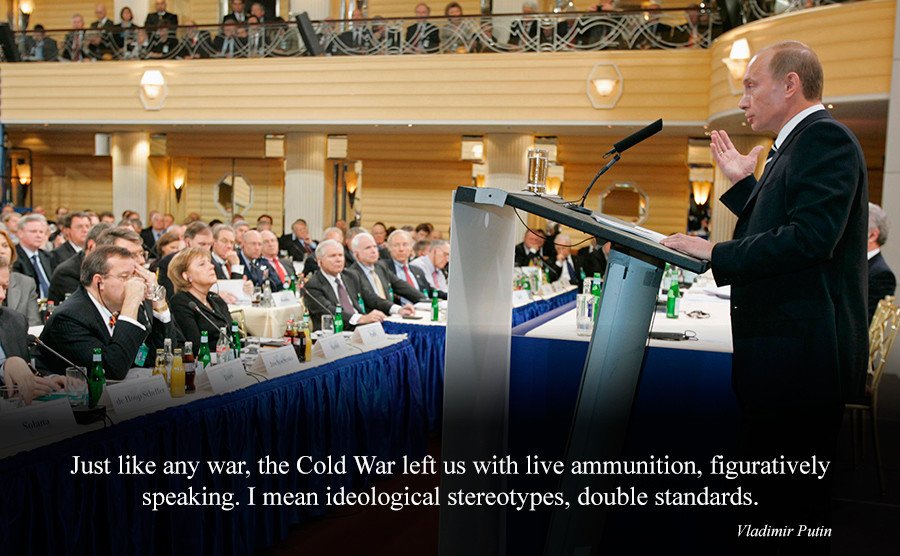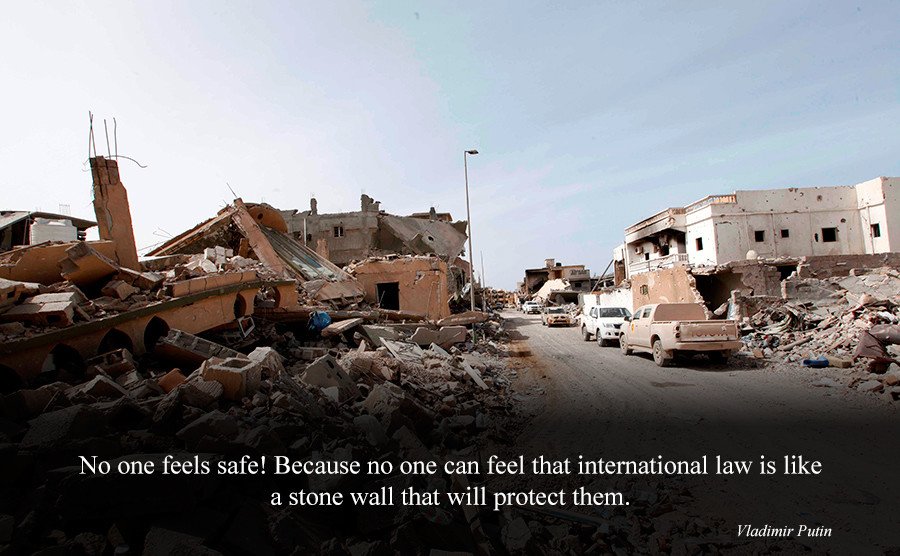On February 10, 2007, Vladimir Putin delivered his keynote speech at the Munich Security Conference, challenging the post-Cold War establishment. RT looks back a decade to see how accurate his ideas were.
The Munich speech presented criticism of a world in which the US gets to unilaterally take decisions on most important global issues with little regards to the interests of other nations, especially those not allied with Washington.
READ MORE: What will Trump’s ‘respect’ for Putin mean for US-Russia relations?
Putin called such a system inherently unfair and posing various risks to the world, compared to an alternative in which the US has to live by the same laws as the rest of the world and negotiate on conflict issues rather than use military force to resolve them.

“Just like any war, the Cold War left us with live ammunition, figuratively speaking. I mean ideological stereotypes, double standards and other typical aspects of Cold War bloc thinking.”
Over the past year, the US media has upped its rhetoric against Russia, going so far as to accuse it of war crimes and of putting its pawn in the Oval Office.
READ MORE: Kremlin to check if Fox News host who called Putin ‘killer’ apologizes by 2023
“Unilateral and frequently illegitimate actions have not resolved any problems. Moreover, they have caused new human tragedies and created new centers of tension. Judge for yourselves: wars as well as local and regional conflicts have not diminished... And no fewer people perish in these conflicts – even more are dying than before. Significantly more, significantly more!”
Since 2007, the US has continued its military action in Afghanistan and Iraq, played a key role in the devastation in Libya, is currently contributing to the Saudi Arabian intervention in Yemen and has attacked Syrian troops – presumably by mistake.

“In international relations, we increasingly see the desire to resolve a given question according to so-called issues of political expediency, based on the current political climate. And of course, this is extremely dangerous. It results in the fact that no one feels safe. I want to emphasize this – no one feels safe! Because no one can feel that international law is like a stone wall that will protect them. Of course, such a policy stimulates an arms race.”
READ MORE: The bully as the good guy: The looking-glass world of NATO’s threats to Russia
Some leaders tried to play nice and hope for the better. Libya’s Muammar Gaddafi paid compensation and invested oil money in Western banks. This didn’t save him from being summarily executed by US-supported insurgents. Or Ukraine’s Viktor Yanukovich, who caved in to a US-backed armed coup and signed a EU-brokered power-sharing deal with his opponents. The deal was thrown away a day later, and the president reportedly barely dodged an assassination attempt while fleeing to Russia.
“The use of force can only be considered legitimate if the decision is sanctioned by the UN,” Putin said. “And we do not need to substitute NATO or the EU for the UN. When the UN truly unites the forces of the international community and can really react to events in various countries, when we leave behind this disdain for international law, then the situation will be able to change. Otherwise the situation will simply result in a dead end, and the number of serious mistakes will be multiplied.”
NATO’s mandate in Libya was to protect civilians from airstrikes. The alliance did this with a bombing campaign that targeted anything remotely resembling a military asset. Apparently that included Gaddafi’s youngest son and three grandchildren killed by a missile intended for the man himself. The UK and France played key roles in the campaign.
“I think it is obvious that NATO expansion does not have anything to do with the modernization of the alliance itself or with ensuring security in Europe,” Putin said back in 2007. “On the contrary, it represents a serious provocation that reduces the level of mutual trust. And we have the right to ask: against whom is this expansion intended? And what happened to the assurances our western partners made after the dissolution of the Warsaw Pact? Where are those declarations today? No one even remembers them.“
Over the past decade, NATO has absorbed two more nations, Albania and Croatia, and drawn closer with Montenegro, Bosnia and Herzegovina and Georgia. The Ukrainian government has declared NATO membership a priority. NATO has deployed additional troops at Russia’s border and moved to build an anti-missile system, which Russia sees as a threat to its national security.
“Let's say things as they are,” Putin said in his Munich speech. “One hand distributes charitable help and the other hand not only preserves economic backwardness but also reaps the profits from it. The increasing social tension in depressed regions inevitably results in the growth of radicalism and extremism, feeding terrorism and local conflicts. And if all this happens in, shall we say, a region such as the Middle East where there is increasingly the sense that the world at large is unfair, then there is the risk of global destabilization.“
In Iraq and Syria, the terrorist group Islamic State for a while managed to create a more or less functioning state. Their success was to a great degree fueled by propaganda that blamed alienation and disfranchisement of Muslims to the malice of the West. This message attracts not only desperate locals, but also Muslims in wealthy Western countries.

